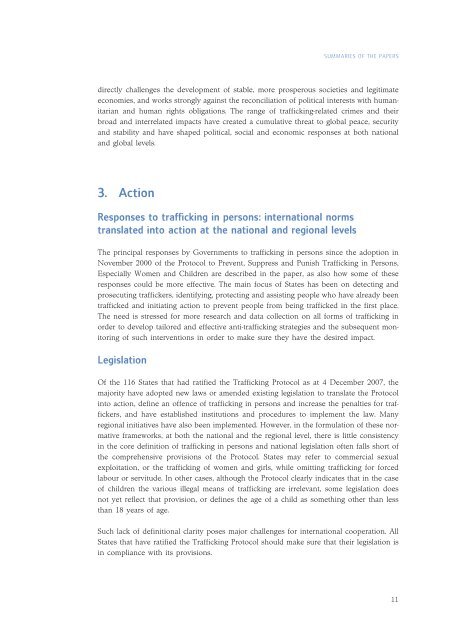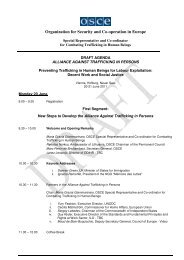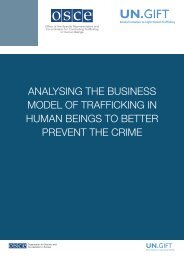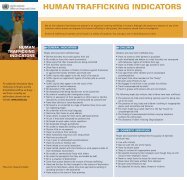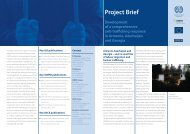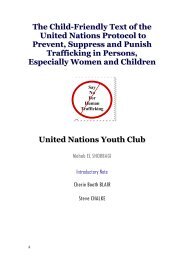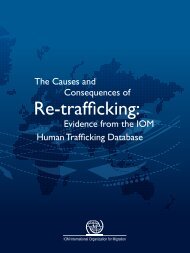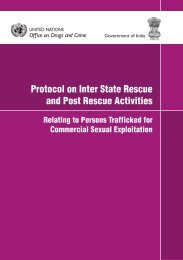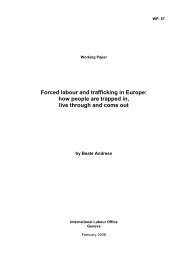An Introduction to Human Trafficking - United Nations Office on ...
An Introduction to Human Trafficking - United Nations Office on ...
An Introduction to Human Trafficking - United Nations Office on ...
Create successful ePaper yourself
Turn your PDF publications into a flip-book with our unique Google optimized e-Paper software.
SUMMARIES OF THE PAPERS<br />
directly challenges the development of stable, more prosperous societies and legitimate<br />
ec<strong>on</strong>omies, and works str<strong>on</strong>gly against the rec<strong>on</strong>ciliati<strong>on</strong> of political interests with humanitarian<br />
and human rights obligati<strong>on</strong>s. The range of trafficking-related crimes and their<br />
broad and interrelated impacts have created a cumulative threat <str<strong>on</strong>g>to</str<strong>on</strong>g> global peace, security<br />
and stability and have shaped political, social and ec<strong>on</strong>omic resp<strong>on</strong>ses at both nati<strong>on</strong>al<br />
and global levels.<br />
3.—Acti<strong>on</strong><br />
Resp<strong>on</strong>ses <str<strong>on</strong>g>to</str<strong>on</strong>g> trafficking in pers<strong>on</strong>s: internati<strong>on</strong>al norms<br />
translated in<str<strong>on</strong>g>to</str<strong>on</strong>g> acti<strong>on</strong> at the nati<strong>on</strong>al and regi<strong>on</strong>al levels<br />
The principal resp<strong>on</strong>ses by Governments <str<strong>on</strong>g>to</str<strong>on</strong>g> trafficking in pers<strong>on</strong>s since the adopti<strong>on</strong> in<br />
November 2000 of the Pro<str<strong>on</strong>g>to</str<strong>on</strong>g>col <str<strong>on</strong>g>to</str<strong>on</strong>g> Prevent, Suppress and Punish <str<strong>on</strong>g>Trafficking</str<strong>on</strong>g> in Pers<strong>on</strong>s,<br />
Especially Women and Children are described in the paper, as also how some of these<br />
resp<strong>on</strong>ses could be more effective. The main focus of States has been <strong>on</strong> detecting and<br />
prosecuting traffickers, identifying, protecting and assisting people who have already been<br />
trafficked and initiating acti<strong>on</strong> <str<strong>on</strong>g>to</str<strong>on</strong>g> prevent people from being trafficked in the first place.<br />
The need is stressed for more research and data collecti<strong>on</strong> <strong>on</strong> all forms of trafficking in<br />
order <str<strong>on</strong>g>to</str<strong>on</strong>g> develop tailored and effective anti-trafficking strategies and the subsequent m<strong>on</strong>i<str<strong>on</strong>g>to</str<strong>on</strong>g>ring<br />
of such interventi<strong>on</strong>s in order <str<strong>on</strong>g>to</str<strong>on</strong>g> make sure they have the desired impact.<br />
Legislati<strong>on</strong><br />
Of the 116 States that had ratified the <str<strong>on</strong>g>Trafficking</str<strong>on</strong>g> Pro<str<strong>on</strong>g>to</str<strong>on</strong>g>col as at 4 December 2007, the<br />
majority have adopted new laws or amended existing legislati<strong>on</strong> <str<strong>on</strong>g>to</str<strong>on</strong>g> translate the Pro<str<strong>on</strong>g>to</str<strong>on</strong>g>col<br />
in<str<strong>on</strong>g>to</str<strong>on</strong>g> acti<strong>on</strong>, define an offence of trafficking in pers<strong>on</strong>s and increase the penalties for traffickers,<br />
and have established instituti<strong>on</strong>s and procedures <str<strong>on</strong>g>to</str<strong>on</strong>g> implement the law. Many<br />
regi<strong>on</strong>al initiatives have also been implemented. However, in the formulati<strong>on</strong> of these normative<br />
frameworks, at both the nati<strong>on</strong>al and the regi<strong>on</strong>al level, there is little c<strong>on</strong>sistency<br />
in the core definiti<strong>on</strong> of trafficking in pers<strong>on</strong>s and nati<strong>on</strong>al legislati<strong>on</strong> often falls short of<br />
the comprehensive provisi<strong>on</strong>s of the Pro<str<strong>on</strong>g>to</str<strong>on</strong>g>col. States may refer <str<strong>on</strong>g>to</str<strong>on</strong>g> commercial sexual<br />
exploitati<strong>on</strong>, or the trafficking of women and girls, while omitting trafficking for forced<br />
labour or servitude. In other cases, although the Pro<str<strong>on</strong>g>to</str<strong>on</strong>g>col clearly indicates that in the case<br />
of children the various illegal means of trafficking are irrelevant, some legislati<strong>on</strong> does<br />
not yet reflect that provisi<strong>on</strong>, or defines the age of a child as something other than less<br />
than 18 years of age.<br />
Such lack of definiti<strong>on</strong>al clarity poses major challenges for internati<strong>on</strong>al cooperati<strong>on</strong>. All<br />
States that have ratified the <str<strong>on</strong>g>Trafficking</str<strong>on</strong>g> Pro<str<strong>on</strong>g>to</str<strong>on</strong>g>col should make sure that their legislati<strong>on</strong> is<br />
in compliance with its provisi<strong>on</strong>s.<br />
11


